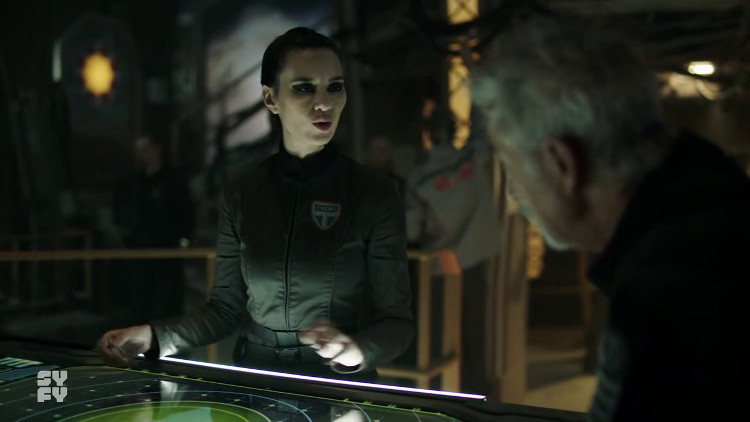Preliminary notes towards a serious review of The Expanse

How do I love thee, teevee show?
Let me enumerate the ways ...
It has been noted before, by me and many others, that we live in the Golden Age of Television. My personal honour roll includes such singular creations as Orphan Black, Atlanta, Rick and Morty, Treme, The Wire, Community and, most recently and especially, The Expanse.
No doubt, your list will vary — perhaps Deadwood is on it, or Strange Empire, or The Sopranos or Mad Men or Game of Thrones or ...
Or, or, or ... Those far-from-exhaustive lists are very much the point. Only a few years after it seemed "reality" shows would be the death of scripted television, there has been an explosion of good — or at least ambitious — stuff.
But for my money, The Expanse is the gilding on our Golden Age. It is a science fiction program that doesn't (hardly) cheat on the science; that presents three societies (Terran, Martian, and Belters) that are, each of them, complex, with multiple factions and vision and interests; that features full-blown people as its principles, each with back-stories, motivations and neuroses that are only sometimes in sync with their friends and lovers.

It is, in short, far more than the sum of its (excellent) parts. Allow me to enumerate a few of them.
- The writing | This is a show that moves. Some have complained that things sometime happen a little too fast. I disagree. The Expanse is a program that has a story to tell; this is Game of Thrones, where after a couple of seasons it became pretty clear that the creators had not particular end-game in sight, and so more and more came to rely on soap opera plot devices and soap opera pacing to keep viewers involved. (I confess: I think I gave up on that show the season of "The Red Wedding".)
The Expanse moves fast, because a lot happens in it. And that's a good thing. - The Women | It is not quite unique for science fiction to offer female protagonists as fully-realized human beings, but it's far from common. And in my experience only Orphan Black can rival The Expanse in that department. But the former was much more constricted in its canvas. Where Orphan Black offered a multitude of clones, The Expanse gives us a middle-aged diplomat cum politician; a brilliant young engineer running from an unhappy past; a young, idealistic Martian marine; an all-too filial daughter bent on revenge for her father's downfall; a married Reverend with a thirst for adventure that threatens her calling and her family; a fierce rebel fighter in a struggle to lead a revolutionary army ...
And those are just off the top of my head. - The Diversity | Did I mention that the diplomat is of south-east Asian background? That the engineer and the Martian marine are black? That the filial daughter is oriental? That the fierce rebel is an Ojibwe Canadian in real life? Or that many of the other people we come to know over the course of the program's three seasons (so far!) are also, well, not white?
For that matter, even the white people on this show are seldom the blue-eyed blondes so common on American television. And, while we're on the subject of looks, one might think that the casting directors set about to not include any actor with standard (American) "good" looks. This show's diversity is more than skin deep. It goes to wide, flat noses, to women with flesh, to men with wiry black facial hair. I could go on. And I could, perhaps, withdraw my suggestion that the show-runners were deliberately trying to subvert standard American television looks, in favour of the possibility they simply tried to pick the best actors for the roles.
br /> Regardless, the cast of The Expanse doesn't look much like most American television, but comes at least somewhat close to what any big, multicultural city street looks like. - The Relationships | First of all, they vary. A lot. But I will take a brief look at the relationship between Naomi (the aforementioned engineer) and James Holden, the ship's (it's a science fiction program; of course there's a ship!) captain and the closest we have to a full-on protagonist.
James and Naomi start off as distant colleagues, thrown together by bad luck into an intimate working relationship that, slowly, becomes a love affair. But Naomi, as a character, is never "the love interest". She starts out as, and remains, a protagonist in her own right. (Indeed, one of season three's main plots concern the repercussions Naomi faces from Holden and the rest of her crew for a decision she made at the end of the second season. Her "betrayal", and her eventual reconciliation with both lover and friends is a master-class in writing that respects all of the characters as people, not roles.
Naomi may be Holden's lover, but it is always clear that that relationship does not define her. - The Newtonian Physics | I want to say the show doesn't cheat on the physics, but it's not really true.
50 years after 2001: A Space Odyssey blazed a silent trail it remains the road less followed; The Expanse joins the Star Wars crowd in ignoring the fact that there is no sound in a fucking vacuum!
Le sigh.
So, engines roar, bullets shriek and metal groans when it's punctured or torn. It irks me, but the rest of the show is so good, I'll forgive the trope and pretend the sounds are a form of background music.
Where it excels in providing at least a verisimilitude of Newtonian physics. In reality, space is (to crib from Douglas Adams) quite big, thank you, and The Expanse provides us with the sense that it takes a lot of time to get from point A to point B. A voyage from one asteroid to another takes time; even a missile fired from one ship to another, takes time.
I imagine a physicist doing the necessary calculations would find all sorts of signifcant errors and outright cheating, but for a civilian viewer, The Expanse offers, as I said, verisimilitude. No Luke Skywalker hopping from one solar system to another in a fighter unequiped with a warp drive (or whatever they called faster-than-light speed technology in that franchise).
All that is a welcome change, as it the fact that the show remembers that there is no gravity in space; characters wear magnetic boots, they suffer under acceleration, they sometimes float in zero G. Quite a lot for a television show with what one presumes is a relatively small budget. (The special effects are not first-rate, but they are very good examples of second-tier work; no danger of one's suspension of disbelief being broken by laughable visuals.) - The Politics | I mentioned earlier that there are three main factions depicted on The Expanse. But none of them are monolithic, and all of the various sub-cultures harbor misguided ideas about the other(s). In the world(s) according to The Expanse, individuals matter, they can affect things — even change things — but so too do groups, from small cabals to a mindless mobs. No one is in full control, of anything.
- The Humour | The Expanse is a high intensity drama whose characters are forever chasing events at least partially beyond their control. But it is not an action adventure (though when there is action, it is invariably really well done). The characters are given time to breathe; viewers are given time to care about them, about their motivations and their backstories. (That quiet moment when strong-man Amos explains why he knows how to walk in heels is a priceless example.)
And part of the way we come to care about these people is through their senses of humour. There aren't many jokes on The Expanse, but there are a lot of chuckles, and no few laughs. As in real life, there are quips, there are bon mots, there is humour in contextual repetition. In short, and to repeat myself, the show is rich with deeply-etched characters. - The Action | There aren't a lot of action sequences in The Expanse, but when they happen — where as ship-to-ship or hand-to-hand combat — they are invariably well-directed.
- The Villains | Even the show's most reprehensible characters are portrayed as something more complicated than just evil. There are thugs and sadists on the show, but even they are depicted as telling themselves stories that make their villainy necessary. We get the sense that even Dr. Strictland — torturer of children — thinks he is a good guy, doing horrible things for the greater good.

There is a one hell of a lot more to be said in praise of The Expanse. The acting is of an almost BBC level of craft; the broader story evinces what a friend called an "optimistic outlook on humanity without being schmaltzy or unrealistic" — and, I will add, while facing up to some of the worst that humanity has to offer as well.
And, as with the best "real" science fiction, it provides us with that ol' sensa-wonda in proverbial spades.
If you have been watching The Expanse I'd be delighted to know what you think of it; if you haven't been, I hope to hell what I've written is enough to convince you to check it out.


















